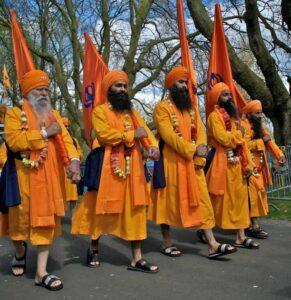
Vaisakhi, the day of the creation of the Khalsa, is one of the most important festivals in the Sikh calendar with colourful processions, bhangra dancing and displays of gatka martial arts. It is a time when we remember the courage of the five Sikhs who, in response to Guru Gobind Singh’s call, showed their readiness to give their lives for the inspiring and egalitarian teachings of the Gurus. It’s a powerful message relevant to both Sikhs and non-Sikhs in the world of the 21st century.
At Vaisakhi, Sikhs are required to pledge themselves to reflect on and uphold uplifting key Sikh beliefs. Let us remember them together. First there is belief in One God, the Creator of all that exists. Sikhs see different religions as different paths to God which should all be respected. This respect extends beyond mutual tolerance to a readiness to give our life for others to worship in the manner of their choice, as exemplified by Guru Teg Bahadur. Sikh teachings stress that no one religion has a monopoly of truth and are critical of those who argue that theirs is the only way, or that theirs is the final revelation. The Gurus also criticised all notions of caste or race in our one human family, and emphasised the dignity and full equality of women.
In Europe after the French revolution in 1789, the cry was for ‘liberty, equality and fraternity’. Nearly a century earlier, Guru Gobind Singh taught the same ideals, to which he also added the important need for humility.
Today we should pledge ourselves to eschew all factions in our community and unite as one in promoting these teachings for the benefit of our children and the wider world.
Waheguru ji ka Khalsa; Waheguru ji ki Fateh
Lord (Indarjit) Singh of Wimbledon

